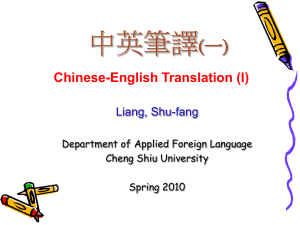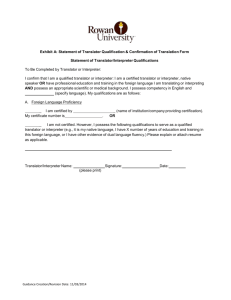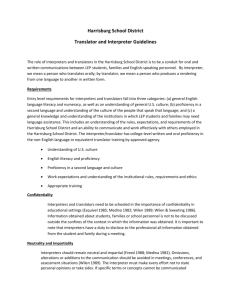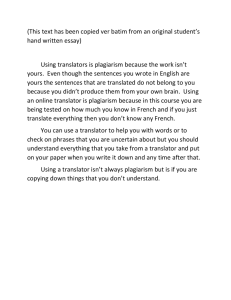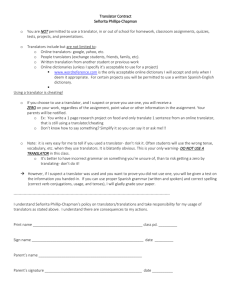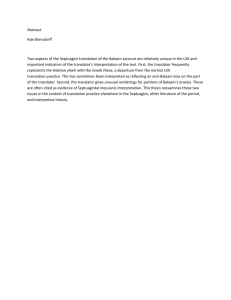translators and interpreters: can they be friends
advertisement
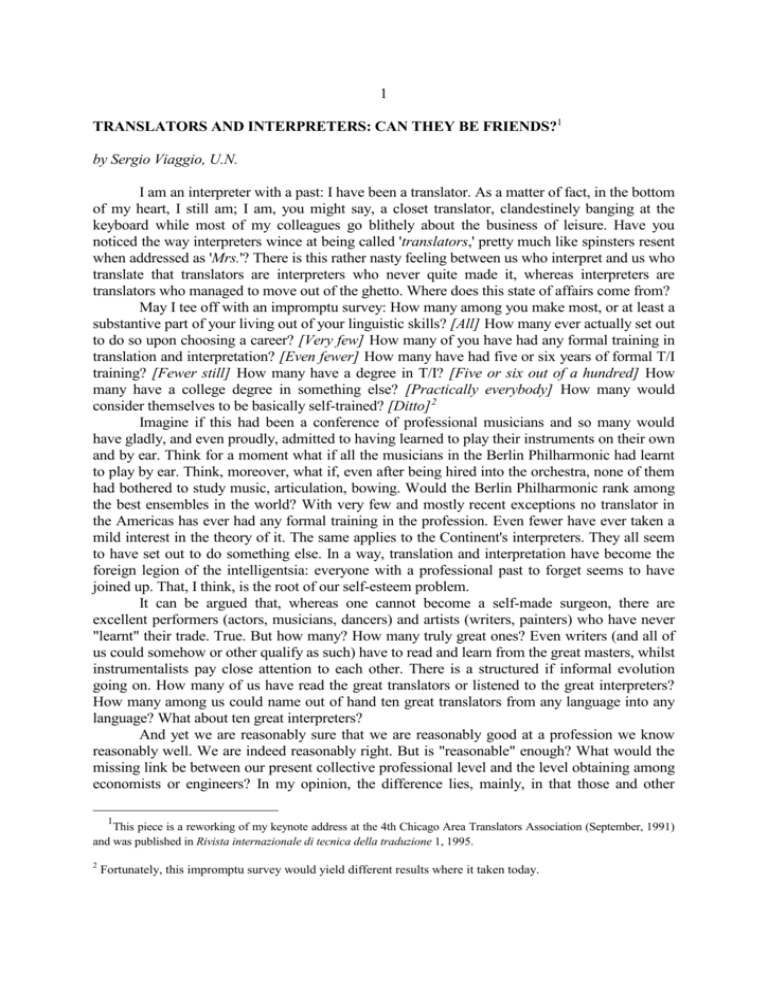
1 TRANSLATORS AND INTERPRETERS: CAN THEY BE FRIENDS?1 by Sergio Viaggio, U.N. I am an interpreter with a past: I have been a translator. As a matter of fact, in the bottom of my heart, I still am; I am, you might say, a closet translator, clandestinely banging at the keyboard while most of my colleagues go blithely about the business of leisure. Have you noticed the way interpreters wince at being called 'translators,' pretty much like spinsters resent when addressed as 'Mrs.'? There is this rather nasty feeling between us who interpret and us who translate that translators are interpreters who never quite made it, whereas interpreters are translators who managed to move out of the ghetto. Where does this state of affairs come from? May I tee off with an impromptu survey: How many among you make most, or at least a substantive part of your living out of your linguistic skills? [All] How many ever actually set out to do so upon choosing a career? [Very few] How many of you have had any formal training in translation and interpretation? [Even fewer] How many have had five or six years of formal T/I training? [Fewer still] How many have a degree in T/I? [Five or six out of a hundred] How many have a college degree in something else? [Practically everybody] How many would consider themselves to be basically self-trained? [Ditto] 2 Imagine if this had been a conference of professional musicians and so many would have gladly, and even proudly, admitted to having learned to play their instruments on their own and by ear. Think for a moment what if all the musicians in the Berlin Philharmonic had learnt to play by ear. Think, moreover, what if, even after being hired into the orchestra, none of them had bothered to study music, articulation, bowing. Would the Berlin Philharmonic rank among the best ensembles in the world? With very few and mostly recent exceptions no translator in the Americas has ever had any formal training in the profession. Even fewer have ever taken a mild interest in the theory of it. The same applies to the Continent's interpreters. They all seem to have set out to do something else. In a way, translation and interpretation have become the foreign legion of the intelligentsia: everyone with a professional past to forget seems to have joined up. That, I think, is the root of our self-esteem problem. It can be argued that, whereas one cannot become a self-made surgeon, there are excellent performers (actors, musicians, dancers) and artists (writers, painters) who have never "learnt" their trade. True. But how many? How many truly great ones? Even writers (and all of us could somehow or other qualify as such) have to read and learn from the great masters, whilst instrumentalists pay close attention to each other. There is a structured if informal evolution going on. How many of us have read the great translators or listened to the great interpreters? How many among us could name out of hand ten great translators from any language into any language? What about ten great interpreters? And yet we are reasonably sure that we are reasonably good at a profession we know reasonably well. We are indeed reasonably right. But is "reasonable" enough? What would the missing link be between our present collective professional level and the level obtaining among economists or engineers? In my opinion, the difference lies, mainly, in that those and other 1 This piece is a reworking of my keynote address at the 4th Chicago Area Translators Association (September, 1991) and was published in Rivista internazionale di tecnica della traduzione 1, 1995. 2 Fortunately, this impromptu survey would yield different results where it taken today. recognised professionals learn to operate also with scientific, and not only spontaneous concepts. Did bathtubs necessarily overflow before Archimedes came up with his principle? I do not think so. All that Archimedes did was to turn a spontaneous concept into a scientific one. The first step of every science has systematically been that passage: experience had been there all the time, but only when it turns into awareness -collective awareness, at that- can we talk about science. No, bathtubs did not necessarily overflow before Archimedes; people spontaneously knew that they had to leave room for themselves in the water. But that spontaneous empiric knowledge could not help the development of physics. Someone had to ponder and understand why, and then communicate it to others. For all we know, Harvey may well have not been the first to notice that blood circulates or Newton the first one to remark that all things are somehow attracted to each other but more so to the centre of the earth; but they were the ones who turned such empiric observation into scientific concepts and integrated them into the universal knowledge of mankind. As a consequence, today any twelve-year old schoolboy knows more physics than Archimedes, and the freshman at a medical college is already a more highly qualified physician than Harvey. Interpretation is, perhaps, one of the oldest intellectual activities man ever engaged in. The fact has been used as proof a) that interpreters are born, not made, and b) that there is, therefore, absolutely no need for any theory; the same is adduced about translation, of course. In how many westerns have we all seen the Lieutenant, fresh from West Point, have his ignorance and arrogance corrected by the illiterate scout? If less successfully, how many rough-hewn celluloid pioneers have told their intellectually-minded offspring that 'You don't need no books to farm good?' Warfare and agriculture are much older than interpretation or translation, yet nobody could seriously argue that generals and agronomists are born or that they need no theory. If patriotism is the last refuge of a scoundrel, negation of theory is the last refuge of the interpreter/translator who does not really care how good his job is or how to make it better. Even a provincial physician keeps abreast of literature. I still have to meet someone argue against theory who has actually read enough to pass judgement. Is it possible that all the spontaneous concepts of fidelity, of meaning, of text-type with which we all -good and bad alike- have to operate cannot or need not turn into scientific concepts that, once communicated and systematised, could pave the way for their own development and eventual obsolescence and supersedure, the way Newton's theory of gravity was superseded by Einstein's of relativity? I have been referring to spontaneous and scientific concepts: Vygotsky (1934) explains that before going to school, the child operates only with spontaneous concepts. Once upon the academic road, he is taught scientific ones. The difference between them is that spontaneous concepts are learnt bottom up, empirically - they are simple intuitive generalisations. Scientific concepts, on their part, are learnt top down, verbally, from the adults. The advantage of spontaneous concepts is that they relate so immediately to the child's experience that they become easily assimilated and entrenched - not always for the better, as we know. Their disadvantage is, precisely, their immediateness, their un-criticality, their non-verbality, the fact that they are impossible to systematise, unless they become verbal, i.e. scientific. Any child, say, seven years old knows what the word 'uncle' means, and can point to all relevant 'uncles' within his experience, but he could not define the concept in the abstract. He will have, though, no problem adding and subtracting abstract figures taught at school. Once scientific learning is afoot, scientific concepts, learnt from above, start climbing down to experience: the child will be able to tell whether he is being given back the right change for his candy. Spontaneous concepts, on their part, will begin climbing up: the child will eventually become aware that uncles are the brothers of parents. This process takes part in the child and goes on throughout adulthood. Individually, it marks the person's progress; collectively, it signals the progress of mankind. The scientific concepts of Democritus and Pythagoras have become the spontaneous concepts of most schoolchildren above ten or eleven. But let us listen to what Vygotsky had to say 60 years ago using as an example the crucial distinction between the spontaneous acquisition of speech and the scientific learning of grammar once the child goes to school: "Grammar is a subject that seems of little practical use. Unlike other school subjects, it does not give the child new skills. He conjugates and declines before he enters school. ... The child does have a command of the grammar of his native tongue long before he enters school, but it is unconscious, acquired in a purely structural way, like the phonetic composition of words. If you ask a young child to produce a combination of sounds, for example /sk/, you will find that its deliberate articulation is too hard for him; yet within a structure, as in the word Moscow, he pronounces the same with ease. The same is true of grammar. The child will use the correct case or tense within a sentence, but cannot decline or conjugate a word upon request. He may not acquire new grammatical or syntactic forms in school, but, thanks to instruction in grammar and writing, he does become aware of what he is doing and learns to use his skills consciously... Grammar and writing help the child to rise to a higher level of speech development." (pp. 183-184) Again, as Marx would put it, he turns his practical experience into awareness. Spontaneous lore becomes scientific knowledge. "The development of spontaneous concepts knows no systematicity and goes from the phenomena upward toward generalisations... The difficulty of scientific concepts lies in their verbalism, i.e. in their excessive abstractness and detachment from reality. At the same time, the very nature of scientific concepts prompts their deliberate use, the latter being their advantage over spontaneous concepts... When asked to define the concept 'brother,' a student turns out to be more confused than when asked the Archimedes principle. The understanding of 'brother' is deeply rooted in the child's experience and passes a number of stages before arriving at the definition of the conceptual form." (pp. 148-158) The same distinction between spontaneous and scientific concepts obtains between the learning of one's native language and that of a second one already in school. The difference lies in that when learning the second language we are using the semantics of the first one as a basis (which explains interferences); and yet the acquisition of both first and second languages belong to the same general class of speech development. Every syllable Vygotsky writes about spontaneous and scientific concepts in relation to the child could be easily extrapolated to translators and interpreters. For instance, the key concept of deverbalisation propounded by the Paris school and all those of us who distinguish between linguistic meaning and extra-linguistic sense lies, precisely, in deliberately, consciously, i.e. scientifically not blindly using the semantics of the original as a basis of the translation, i.e. the deliberate, conscious, scientific return to spontaneity of expression. The acquisition of whatever scientific concepts about T&I there exist or that the translator/interpreter himself can come up with will allow him to enter a new, higher stage of development as a practitioner. His constantly conscious, deliberate practice with such concepts will allow them very quickly to become automatic, i.e. again spontaneous, leaving awareness free to discover yet new scientific concepts, and, to boot, allowing in turn for a greater adequate automatization of adequate translational behaviour, which makes a translator both better and faster (Wilss 1989). Only when the vast majority of translators and interpreters actually graduate from schools of T&I, and only if such schools teach them scientific concepts and tutor them in their practical use, i.e. instil the theory in order to improve and accelerate practice, will T&I start collectively developing as a profession and a science, where insights newly gained become eventually lessons of the past, and the scientific concepts of today the spontaneous concepts of tomorrow. Only then will we, collectively, be able to say 'I am a translator or interpreter,' with the same fat-walleted pride of an engineer - not while anybody actually gets the job who thinks that because he can spontaneously twist two languages he is capable of translating between them, as is so often the case. What are, then, the scientific concepts of our discipline? What have our bathtub meditators have come up with so far? For starters, that T&I are different forms of mediated inter-lingual communication. Which does not sound like too much of an insight, except that mediated inter-lingual communication must share the fundamental characteristics of interlingual communication in general; and that inter-lingual communication must itself share the basic traits of any lingual communication; and, lastly, that lingual communication is but a specific form of human communication. If there is such a thing as communication without language, then language, let alone any specific pair of languages, is no longer the source of our activity, only its tool. And, as I shall hammer down again, we simply cannot learn to use a tool correctly unless we know exactly what it is used for and how. Language, on its part, is but the most complex and basic of several semiotic systems developed by man to communicate things non-linguistic: emotions, thoughts, wishes. It is those emotions, thoughts and wishes that we frame linguistically in order to have them communicated to someone else. Thought and language are not the same thing, even if very much linked. If they were, translation, nay, communication would be impossible. If language and thought are not isomorphic, communication will have been achieved not just when thought is linguistically coded by the speaker, nor as soon as it is linguistically decoded by the addressee, but only when and insomuch as the addressee understands the sense intended by the addresser; and this takes place only once he has been able to connect what he sees and/or hears with what he knows, his dictionary with his encyclopaedia, the linguistic with the extra-linguistic. Precisely because thought and language are not one and the same thing, language can be changed leaving thought intact (our interpretation of Archimedes's principle does not depend on what language we have learnt it in), or remain intact while the thought is changed: Linguistically, the English sentence "It is raining" will always mean "It is raining," because the system of the English language has no other meaning foreseen for it. But the utterance of such sentence in speech, as a means of conveying a message to an interlocutor, may mean 'I'd rather stay in,' or 'The drought is over,' or 'That is why I won't open the window,' or 'Don't forget your umbrella.' All those senses (extra-linguistic), all those thoughts, can be conveyed by means of the same linguistic framing, i.e. the same linguistic meaning. Conversely, the same sense, the same thought, can be linguistically framed differently 'Close the window,' 'It is cold,' 'Aren't you cold too?' 'Brr!' - within the same linguistic system or in different ones: 'Cierra la ventana,' 'Mnje kholodno,' 'E tu non hai freddo?' The task of the mediator is to preserve sense while changing meaning - and not only in the case of the translator: also in that of the adapter of literature for children, for instance. Mediation need not be inter-lingual. In other words, the translator or interpreter must be aware of the fact that every utterance, every text, is an act of speech; that there is more to it than its lexical and grammatical meaning. A prominent place should therefore be given to discourse analysis (or text linguistics, as it is also called). An indispensable tool of discourse analysis is, of course, speech acts theory, as developed by Austin and Searle, and its concept of implicatures and maxims of conversation (relation, quantity, cooperation, manner, and idiomaticity). So are the components of textuality (the quality of actual texts), as defined by de Beaugrande: cohesion (the relations among the linguistic units used), coherence (the relatedness of concepts), situationality (the relatedness of utterances to the situations in which they occur), inter-textuality (the relatedness between whole texts), intention (of the text producer) and acceptance (by the text receiver), and, lastly, informativity (the ratio between the expected and the unexpected). The translator and the interpreter ought to know the difference and approach their task accordingly. Language is like a bridge linking two shores over a river. Change the location of the bridge, and even if one of the shores remains basically the same, even if the river is not wider, or narrower, or deeper, or shallower - change but one factor, and you cannot possibly build exactly the same bridge. Judge, jury, prosecutor, witnesses, press and public do not listen to the ballistics expert the same way they listen to the defendant. All they care is whether the two bullets match. The expert's 'yes' or 'no' will not be suspect, even if questioned: a mistake is conceivable, but not a lie. The poor defendant, instead, must prove his innocence with each gesture and turn of phrase; each instance of stammering, each slip of the tongue, every 'Yes... I mean, perhaps' will be dissected. The court interpreter ought to know it. If he uses the same approach for the expert and for the defendant, he is making at least one strategic mistake. And once your strategy is amiss, no amount of tactical prowess will be enough. The translator, on his part, cannot go about translating a sonnet the way he would translate a VCR's owner's manual. He will produce a lousy piece of poetry or a befuddling set of instructions, in all probability both. A translator or interpreter ought to know more about what is consciously or unconsciously expected from him by utterer and addressee than either of them, the way the physician knows more about the patient's illness than the patient himself. Like the physician, the translator/interpreter must know the right questions to put to his patients, and he must also know how to interpret the answers rightly. Patients are often mistaken about their own symptoms, or cannot articulate them adequately; what is exactly, after all, 'A kind of like booming sort of pounding somewhere inside my ear'? A translator or interpreter must be an expert at the hermeneutics, i.e. the questioning and interpretation of texts as conveyors of sense. And then he must become an expert at the heuristics, i.e. the invention, as it were, of the right bridge from this particular shore, across this particular river, at this particular place and moment, to that particular shore, with these particular materials, with these particular skills, under these particular subjective and objective circumstances, in this particular allotted time, and, yes, for this particular amount of money. ‘Invention’, by the way, is indeed the right word: few translators or interpreters are aware that their job is not so much to find equivalences as it is to create them. We should start, then, precisely by becoming aware that both T&I are mediated communication, and therefore that the general laws of communication obtain supreme. Then, and only then, comes the rest. Every practitioner must understand that, even though he is to work with objects linguistic, he is not supposed to be a sheer language manipulator. As I pointed out, languages are but tools, and as with any tool, there is little purpose in learning to use it unless one knows beforehand what it is actually used for and how. Languages are used as vehicles of communicative intentions, as objective crystallisers of thought and emotion. They are the pet creatures of man's second signal system; not signs of things, but signs of concepts, signs of other signs: they are our specifically human way of condensing, storing, retrieving, and transmitting experience. In order precisely to understand them as such, "a merely instrumental view of language must give way to a view of language as an object of scientific thought - not a vehicle, but a source of knowledge in itself."3 In other words, even though we know that language is just a tool, we have to study it in itself. T&I need be, of course, multi-disciplinary: linguistic knowledge alone will carry the practitioner only so far. Yet, if linguistic knowledge is not enough, it remains nevertheless essential. The first thing to know, of course, is the General Anatomy of language: what it is, how it has evolved, how it works. Next, its relationship with thought. Translators and interpreters should ideally be aware of 1) the universal principles of human communication, 2) the universal principles of lingual communication, 3) the universal principles of oral as opposed to written lingual communication and 4) the universal principles of mediated inter-lingual communication. The practice of T&I ought always to be the conscious and knowledgeable application of such principles, paramount among them the crucial ontological distinction between linguistic meaning and extra-linguistic sense, language and thought, language and reality, language and speech. We are just beginning to study -let alone solve- these fundamental questions, but whatever knowledge has been gained so far must be assimilated by all of us: the whole debate on fidelity rests on assumptions -whether false or true, spontaneous or scientificabout such relationships. On the one hand, the translator and the interpreter ought to know their active and passive languages in and out. They should be in a position to be consulted on any aspect thereof. Even the most accomplished amateur performer has to re-learn his instrument in a conservatory: it is not enough to play all the right notes (you don't need a teacher for that), but to play them the right way. Similarly, even the most gifted intuitive practitioners have to re-learn language the right way, as a scientific object and not merely a reflex. Languages, therefore, must be learnt -or re-learnt- scientifically. The skill at speaking or understanding them may be benignly taken for granted, but the knowledge of them cannot possibly be: no private teacher, no high school, no school of law will have instilled it; osmosis on the field will not do either. Many have said, and, up to a point, rightly so, that T&I institutions are not language schools; but the linguistic, i.e. scientific, knowledge can neither be discounted nor dismissed. My friend, Mariano García Landa, finds me too much of a 'linguistophile.' He is both right and wrong. As a rule, the translator, and more particularly the interpreter, need not at present really know a lot of linguistics; he must simply be able to understand well, analyse intelligently, and write or talk with a reasonable degree of competence. But I am demanding more than that: I am still aiming at the specialist in mediated inter-lingual communication, the translator/interpreter of the -I hope- no too distant future, who will be with respect to us, his predecessors, what a modern jetpilot is to his, the postilions of yore. On the other hand, as I pointed out above, the practitioner should become nevertheless aware that he is not dealing with linguistic specimens but with texts, and that every text, whether oral or written, is the often distorted, incompetent, insufficient, and always incomplete objectivation of a subjective intention. The translator or interpreter must learn to treat them as such, and approach them very much like a detective looks at the scene of the crime: words are but his circumstantial evidence of sense, which is not to be looked up in dictionaries but in the minds of speakers/writers. 3 Cortese, G.: Intervention in a panel discussion, in Gran, L. & Dodds, J., Editors, The Theoretical and Practical Aspects of Teaching Interpretation, Campanotto Editore, Udine, 1989, p. 143. A feature to be taken into account in this respect is situationality - shared for the interpreter, displaced for the translator. The translator (and the reader of his translation) has little more than the words on the paper to elicit sense out of the text, whereas the interpreter is right there, listening and watching. Essential as well I find the notions of linguistic framing of communicative intentions and of frames and scenarios. In short all the factors and parameters that speakers and writers, readers and listeners bring consciously or unconsciously to bear in the way they communicate through language, and that translators and interpreters should know and use. Many an intuitive translator/interpreter does precisely that. But a true profession cannot be at the mercy of its practitioners' individual intuition; I would have become a better professional, in a shorter time and with more sanity had someone taught me or had I read in a book what I was forced to discover on my intuitive own. Lastly, the practitioner must understand that his encyclopedia is more important than his dictionary, as Marianne Lederer so admirably puts it. Understanding a message is being able to relate its linguistic form and content to one's knowledge of the world. No amount of linguistic prowess will bail out the translator or the interpreter -or, for that matter, the common mortalwho does not understand what is being talked about. This brings in yet another crucial set of things to be learnt. Many T&I schools are postgraduate; they admit lawyers, engineers and whatnot, rightly assuming that the translator or interpreter must know more than just languages. But how is a lawyer going to become a technical translator or an engineer a legal one? Besides, we all know that the market does not bear -or need- such narrow specialisation. The translator/interpreter, the specialist at mediated inter-lingual communication, does not need to be a specialist in any particular branch of knowledge; but he must instead be able to grasp the basic notions of all of them. If he wants to earn his living as a specialist in interlingual mediation, if he is therefore not after building bridges or defending the accused or curing cancer, what on earth does he want to spend six years studying nothing but law or nothing but engineering or nothing but medicine for? Better learn General Anatomy, yes; and Introduction to Biology, of course; and basic modern Mathematics, indeed; and the introduction to quite a few other disciplines whose knowledge he will be needing for the myriad different documents and conferences he will have to deal with in his professional life, not as a disaffected -if not failed- agronomist or chemist, but as a successful translator or interpreter. Such subjects ought to be learnt, moreover, not with a view to practice them, but to translate them. The specialist at mediated interlingual communication must know both the thing and the word. He must read about the subject in all his languages, not only in order to enhance his vocabulary, but also to understand the difference in the respective typologies of specialised texts, since he must become a master at specialised text-production in all his active languages. In this new light, the time it takes to become a skilled and polyvalent language mediator is the same it takes to become a skilled and monovalent practitioner of any particular discipline. The would-be language mediator who decides to become first an architect is wasting his time; and if he decides to become a language mediator only after graduating as an architect, he still needs to learn Anatomy, Chemistry, and Philosophy - let alone Linguistics, Philology, Literature and the rest of the language-related disciplines. So far what both translators and interpreters should share as family traits. Their paths begin to separate when the specifics of oral versus written communication come into play. The translator ought to be versed, for instance, in the poetics and rhetoric of his languages, and be able, among other things, to detect and reproduce literary allusions. He should have, in all, a thorough command of the techniques of drafting, among which one of the most important and least considered is the art of proper rhematisation, the correct syntactic placement of the topics and comments of sentence and discourse. Contrary to popular belief among the general public, and among translators and interpreters themselves, a good (and therefore both precise and elegant.. and fast) technical translator can make much more money than the best simultaneous interpreter. Interpreting, in fact, is indeed much easier than translating. The children of immigrants do quite often make excellent interpreters for their parents, even though they could not read, let alone write, their own name in any language. Handling oral speech is much simpler, gestures will do when words fail, and then there is always the cooperative interlocutor willing to help us convey our sense. Interpreting, consecutive interpreting of spontaneous oral speech is much older than writing and therefore than translation. And yet, interpreters are better paid and held generally in higher regard. Also, if interpreting has been around as an activity for ages on end, it is translation that got initially all the attention. Let us remind ourselves that interpreting became a profession, an activity people made a decent living out of, only with the advent of the League of Nations, and became instituted as a discipline only after becoming simultaneous. It is simultaneous conference interpreting that is actually being looked up to. Many theoreticians and practitioners have stressed the crucial difference between the translating of oral speech and the rendering of the written word. But oral speech is, as we have seen, easier to understand, process and produce. More to the point, the crucial fact of speed and memory has been invoked. Daniel Gile suggests that the difference between translators and interpreters may lie not so much in the medium with which they work as in the fact that interpreters have to work in real time, with the three efforts of hearing/analysing, processing and uttering competing simultaneously for a limited attention capability. What makes simultaneous interpretation, other things being equal, the most demanding of all inter-lingual mediation activities is the fact of those competing efforts being carried out at the same time. Many people who understand well, remember well, and speak well, cannot quite manage to do all of that at once, while there are those who are not admirable at any of the specific tasks, but handle all three of them simultaneously with decent competence. If, contrary to my assertion above, many translators do not make more than so many interpreters it is because their translational skills are no match for the interpreters' sheer psychomotor prowess; in other words, a mediocre translator will always make less than a mediocre interpreter. Naturally, the good interpreter should be properly conversant with the uses of oral speech - intonation and pause management paramount among them. Condensation and abstracting must be his most valuable weapons. He should be trained in maximising the use of extra-linguistic clues and intonation in order to save breath, for instance, conveying modal information supra-segmentally. He must understand that an unintelligible interpretation, even if "linguistically" unimpeachable, is a useless interpretation; and that a useless interpretation is, by definition, a bad interpretation. He must be aware that he is not paid to understand, or to speak, but to be understood. If the speaker is un-interpretable, then let him go un-interpreted. Any doctor will refuse to operate on a jolting patient. Again, stress should be made in the typology of oral texts and their interpretations: the political conference setting, the technical seminar setting, the judicial setting; informative texts, descriptive texts, narrative texts; the flowery and the utterly incompetent texts; etc. Most importantly, perhaps, the interpreter should be aware of the evanescence of words. People do not listen for or remember words but ideas. You could retell what I have said, but you could not possibly do it in the same words; nor, by the way, could I. A fact, to my knowledge, totally overlooked is that of the phonatory organs. The interpreter should know how his tool works and how to take care of it. The first thing a training institution should do for him is groom his voice. Like a singer or an actor, he will have to make a living out of his throat, speaking contra natura and often in extreme conditions. Coming back full circle, the interpreter must understand that he cannot hope to improve his languages or his translational skills in the booth. For that he requires the desk, the dictionary, the grammar, the encyclopedia. He should go on translating if he can, if nothing else as sheer practice. I, for one, have never stopped translating, and, let me insist, if you are really good and fast, you can make much more money in six hours of translating than in a day of interpreting. Last but not least, both translators and interpreters should endeavour to keep abreast of developments in their field by subscribing to relevant scientific and professional publications as well as attending refresher courses and professional conferences, exactly as physicians, for instance, do. The argument goes that one thing is to teach a physician to translate, and quite another to teach a translator to operate. Viewed this way, translation, even successful translation, looks much easier than medicine. The fallacy lies in that by teaching a physician to translate the way most self-appointed translators do, we are not doing the equivalent of teaching a translator to operate, but of teaching him to treat a wound or mend a bone; and that is something men have been doing for time immemorial without any need for literacy. Sure enough, most translations can be accomplished by superficially qualified practitioners, exactly the same way most colds can be treated by a nurse. Now, it is definitely not so difficult to turn a translator into a nurse; easier, perhaps, than making a specialist in mediated inter-lingual communication out of a neurosurgeon. Most of us, unfortunately, are blissfully unaware of the vast progress made by the relatively few of our colleagues who have actually meditated in the bathtub. Not that the latter have kept their insights to themselves; but who among you is subscribed to Meta, Babel, TTR, Lebendesprache, Cuadernos de Traducción e Interpretación, Livius, Sendebar, Perspectives, Target, Traduire, Multilingua, PTI, The Interpreters' Newsletter, Language International or any of the half-a-dozen other specialised periodicals? How many have read an issue of any of them? How many have read a full-fledged book on translation? To wind up then, can translators and interpreters be friends? Most definitely. Friends, colleagues and allies in the hard battle for upgrading the profession, improving the craft, and helping to develop theory, to mould the young, and to establish that sorely needed link between theory, research, observation and practice every self-respecting profession should ensure. Historically, barring a few exceptions such as Cicero, St. Jerome and Dryden, all of whom translated but literary or religious texts (i.e. always 'sacred' texts), few translators have bothered to stop and ponder like Archimedes in the bathtub or Newton under the apple-tree. The fact should not come as a surprise: It has been less than fifty years since people began actually to be paid to translate or interpret, and that a number of them have decided to take up translation and interpretation as a central economic activity. We have just turned into a profession, and more recently still into a discipline; the foundations of our science are just being laid. It is only natural that we take time to organise our profession the way other professions have been established and organised for centuries. Conferences such as this one are the stones paving such way; and I like to think of myself as a humbler scion of Socrates, buzzing about the noble steed's head to keep it perky. BIBLIOGRAPHY de BEAUGRANDE, R.: (1984) Text Production. Toward a Science of Composition, Ablex Publishing Co., New Jersey, 399 pp. GILE, D.: (1985) "Le modèle d'efforts et l'équilibre d'interprétation en interprétation simultanée", Meta XXX-1, pp. 44-48. --(1988) "Le partage de l'attention et le 'modèle d'effort' en interprétation simultanée", The Interpreters' Newsletter 1, Trieste, pp. 4-22. --(1991) "The processing capacity issue in conference interpretation", Babel XXXVII-1, pp. 15-27. SEARLE, J.: (1987a) Expression and Meaning, Cambridge University Press, 187 pp. --(1987b) Speech Acts, An Essay in the Philosophy of Language, ibid., 203 pp. SELESKOVITCH, D. and LEDERER, M.: (1986a) Interpréter pour traduire, Didier Érudition, Paris, 311 pp. --(1986b) La traduction simultanée, expérience et théorie, Didier Érudition, Paris, 454 pp. --(1989) Pédagogie raisonée de l'interprétation, Paris, Didier Érudition, 281 pp. VIGOTSKY, L. S.: (1934) Thought and Language, The MIT Press, Cambridge, 1989, 287 pp. WILSS, W: (1989) "Towards a Multi-Facet Concept of Translation Behaviour", Target 1-2, Amsterdam-Philadelphia, pp. 129-150.
